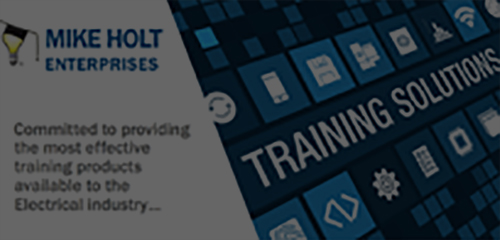- About Us
- Contact Us
- Testimonials
- Continuing Education
- Approved Courses
- Course Login
- Electrical Engineer PDHs
- ICC Approved Courses
- Live CEU Seminars
- NABCEP CEUs
- Electrical Engineering
- Electrical Engineer PDHs
- Engineers Library
- Exam Preparation
- Florida State Exam Prep
- Inspector (Electrical)
- Journeyman Exam Prep
- Masters Exam Prep
- State Licensing Boards
- Free Stuff
- Charts & Calculators
- Code Forum
- Find an Expert
- Find a School
- Graphic of the Day
- Job Board
- Links
- NEC
- Newsletters
- Publications
- Podcasts
- Technical
- Videos
- Instructors & Schools
- Apprenticeship
- Capacitor Login
- ISBNs
- Training Solutions
- Request a Quote
- Products
- Best Values
- Books & DVDs
- Clearance
- Seminars
- CEU Seminars
- Seminar Schedule
Mike Holt’s Electrical Apprenticeship Certifications
I turned to your company to help ensure an active and dynamic learning environment for my students. Your team of electrical professionals helped me craft Curriculum and resources that did more than supplement what we had but, brought it to a new 55dimension. There are many imitators of what you do but none have combined unparalleled service and trade specific knowledge like you have at Mike Holt industries.
Jon DyerMore ...
Learn More
Certifications
These certifications are divided into four levels covering OSHA’s safety rules, electrical theory, the National Electrical Code®, equipment, motors, controls, code calculations, and more. These certifications demonstrate student proficiency to employers as they work toward journeyman electrician status.




Interested in more information? Contact us at Training@MikeHolt.com or call 888.632.2633.
Curriculum Overview
This curriculum resource is divided into separate study sessions designed to deliver a logical flow of material with a strong emphasis on safe work practices and proficiency in the National Electrical Code. It covers the NEC and safety in a manner relevant to today’s electrical apprentices, preparing them to work on the job site and pass the level certifications and ultimately the journeyman exam.
2023 NEC Lesson Plans
All Levels (combined into one document) – Lesson Plan and Syllabus[ PDF 766KB ]
2020 NEC Lesson Plans
Use the lesson plan we provided as an outline to help schedule the semester. You’ll find that every class is different. Depending on the students in the class, some sessions may require more time than allotted while others might go quickly. Please make notes during the semester and provide us with your feedback so we can improve this schedule.
Students learn differently, and the same methods of presentation and study don’t necessarily bring the same results for each individual. Be aware of the differences in learning styles as you present this material to the class. Some students learn better visually and need to see diagrams and illustrations. Others learn from audible input such as lectures and class group discussions. These topics will be covered as part of your instructor certification course and are an integral part of the learning environment.
Hands-on learning is an important component of education, and most of it will be done on the jobsite rather than in the classroom. However, when it’s feasible, do bring equipment and material in to show the class. Just a little “show and tell” of components that your students haven’t yet used, like control pushbuttons or AFCI breakers, can help add understanding to a lesson. When possible, try to supplement classroom instruction with field trips to view live construction projects showcasing the material being studied.
We recommend the lesson material be presented in the form of a lecture and include visual aids such as presentations, videos, student books, and whiteboards.
Involve the students as much as possible. An example is how you handle the questions that are assigned in the textbooks. After completing the questions, have your students take turns reading the question and their answers so they’re involved in the process. Don’t just read the answers to them and don’t just post the answers. Do what you can to interact with your students in discussions and allow their input.
Answer questions honestly, and don’t be afraid to tell your students if you don’t know an answer. Of course, do take time to look it up—explain that you can’t always know all the answers, but that you’re there to help them in the learning process. Make sure your students understand their responsibility in the learning process—they need to do their part by reading and studying the information in their textbooks and participating in discussions. Let them know that learning is a lifelong process, and there are always new things to learn in the electrical field.
You’ll be successful as an instructor if you have a heart for your students. Help them develop a respect for the electrical profession and a love for learning. Log into your school’s account to access the instructor resources for more information on becoming a certified instructor or visit our instructor page.
Mike Holt’s Apprenticeship Training Curriculum is designed to use textbooks, videos, labs, and tests to enhance students’ learning experience.




Learning Made Easy.
Mike Holt
has mastered the art of simplifying technical concepts.
- Writing style is informative, practical, and easy to read and learn
- Industry-leading detailed full-color instructional graphics are great for visual learners
- Powerful Analysis and insightful Author’s Comment break down rules and give background information
- Article and Chapter questions reinforce learning as you proceed
Designed for Success.
The
attention to detail in the textbooks is unparalleled.
- Modular book layout. Information is organized into small manageable learning components
- Step-by-step examples. Sample questions and answers give you practice in calculating solutions
- Colored and underlined text. Chapters colors coordinate to make changes and rules easier to find




 Mike Holt’s Electrical Apprenticeship - LEVEL 1 Certification demonstrates the
knowledge necessary to safely
and proficiently perform the job duties and responsibilities expected of a first
level electrical apprentice.
A passing score is 75% or better, The Mike Holt curriculum resources are not
required in order to take certification exam.
Mike Holt’s Electrical Apprenticeship - LEVEL 1 Certification demonstrates the
knowledge necessary to safely
and proficiently perform the job duties and responsibilities expected of a first
level electrical apprentice.
A passing score is 75% or better, The Mike Holt curriculum resources are not
required in order to take certification exam.

 Mike Holt’s Electrical Apprenticeship - LEVEL 2 Certification demonstrates the
knowledge necessary to safely and proficiently
perform the job duties and responsibilities expected of a second level electrical
apprentice. A passing score is 75% or better,
The Mike Holt curriculum resources are not required in order to take certification
exam.
Mike Holt’s Electrical Apprenticeship - LEVEL 2 Certification demonstrates the
knowledge necessary to safely and proficiently
perform the job duties and responsibilities expected of a second level electrical
apprentice. A passing score is 75% or better,
The Mike Holt curriculum resources are not required in order to take certification
exam.

 Mike Holt’s Electrical Apprenticeship - LEVEL 3 Certification demonstrates the
knowledge necessary to safely and proficiently
perform the job duties and responsibilities expected of a third level electrical
apprentice. A passing score is 75% or better,
The Mike Holt curriculum resources are not required in order to take certification
exam.
Mike Holt’s Electrical Apprenticeship - LEVEL 3 Certification demonstrates the
knowledge necessary to safely and proficiently
perform the job duties and responsibilities expected of a third level electrical
apprentice. A passing score is 75% or better,
The Mike Holt curriculum resources are not required in order to take certification
exam.

 Mike Holt’s Electrical Apprenticeship - LEVEL 4 Certification demonstrates the
knowledge necessary to safely
and proficiently perform the job duties and responsibilities expected of a fourth
level electrical apprentice.
A passing score is 75% or better, The Mike Holt curriculum resources are not
required in order to take certification exam.
Mike Holt’s Electrical Apprenticeship - LEVEL 4 Certification demonstrates the
knowledge necessary to safely
and proficiently perform the job duties and responsibilities expected of a fourth
level electrical apprentice.
A passing score is 75% or better, The Mike Holt curriculum resources are not
required in order to take certification exam.











